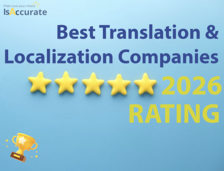Difference Between Notarized and Certified Translation

Author: Mark Blackwood, follow him on LinkedIn and Twitter.
Sometimes, people find it hard to spot the difference between notarized and certified translation. Often, they are asked to provide a document translated by a professional qualified service, so one may get lost which exactly ones do they need. The certified translation aims to show that the document is translated correctly, while notarized translation simply proves that translation copy is true and caters to law. In this article, we will go into detail about this difference.
What is the Difference Between Certified and Notarized Translation?
Purpose. First of all, notarized and certified translation differ as per requirement. For example, certified USCIS translation services are needed when you plan to get USCIS document acceptance. For this purpose, you do not need a notarized translation. On the other hand, notarized translation is common for educational and similar documents.
Quality Check. When a certified translator works on your document, they carefully compare the final and source document to make sure that everything is correct. When the translation is notarized, the specialist doesn’t translate your document but briefly compares it to the original and puts a stamp. The point is not to check the quality but to show that documents can be used in official agencies.
What is a Certified Translation?
This type of translation provides documents with their attested copy that certifies document correctness. Such certification proves that all detailed statement has accurate translation and complete. Also, it shows that the translator is fluent in target and source languages. Such a document shows that translation is done by a Language Service Provider (LSP), which has high chances of document acceptance.
For certification, the original document is translated entirely, with dashes, stamps, marks, seals, and signatures. If something is not clear in the original, the translator has to write “not legible” for these parts of the translation. Such translation should be visually matching to the original, everything has to be in the same places. Only a skilled specialist can do such a job, so it’s better not to do it by yourself. The person might even be certified in a given language pair to provide accurate documents.
Importantly, a certified translation is very legally binding, because the translator is responsible for all the information of the document. The certifications of a specialist mean that they are accredited by a government body which proves that they can properly translate the documents.
What Does Notarization Mean?
Notarized translations differ from the certified one on certain criteria. A notarized translation does not demand a high quality of translation, but rather fulfills the formal requirements of a certain institution. Usually, a professional translator hands in the ready document in the target language to the notary public, who then asks the translator to swear an oath which proves the accuracy of the translation. After this, the translator also signs an affidavit that contains all official details like the signature and seal of the notary. Only after this, the translated document becomes valid.
In the case of notarized translation, the notary certified translation doesn’t check the document’s quality. For them, the identity of the translator is important, because they have to trust their words. So, it is more of a third party check which ensures that the translator completed the work, did their best, and provided accurate results. Notarized translation is rather an act of double security that ensures that the information is correct. If it’s not, the translator could be held liable for completing the wrong translation. That’s why their oath at the notary public is important. Notarized translations are often ordered for semi-legal and smaller legal documents.
What is the Difference between Certified Translation and Certified Translator?
If the translator is certified, that means they have a professional degree from an educational establishment with a major in translation. Also, this person passes the test which proves their ability to work with a certain language pair. Often, such people have certification of the US Translators Association, which means that specialists worked hard to pass the test.
Although hiring a certified specialist for translation of the certified document is preferable, that is not the only variant. If the translator has much experience and is well-qualified, you may trust your translation to them. In many companies, such translation is assigned to the most qualified and experienced specialists. After this, it goes to another specialist for proofreading. They both may not be certified, but translate the same well.
Useful information: If you need to translate your Polish documents please read our review of the 5 best Polish translation services.
Do Translated Documents Need to Be Notarized?
In the present day, you do not need to do both certification and notarization. You need either one or the other, as usually, agencies don’t require both. Also, notarization is less costly because the translator does not compare documents in such a way as certification does. This is acceptable for daily business, so choose notarization for such kinds of documents. Also, it provides a sense of comfort because you know that the translator gave an oath, so they are sure of the result.
Generally, for educational or business purposes, use notarized documents. However, if it’s a government document like a driving license, notarized translation may be unsafe, so use a certified one. Also, for immigration, always certify your documents and bring them in hard copy.
When to Use Certified Translation
Generally, a certified translation is for the cases when you have to submit legal documents. Immigration and education in another country usually involve certified translation. Certified translation is needed when you apply to such instances as USCIS. Recent policies state that only certified translation is acceptable, so you will need it for the following documents:
- Birth Certificate
- Adoption Documents
- Police Verification Background Checks
- Divorce Translations
- Certificate Marriage
- Certificate Court
- Transcriptions
- Business Contracts
- Patent translation
- Informed Consent
- Academic Diploma
- Academic Transcript
- Service Agreements
If you have legal documents in a language that is not English, be sure to order a certified English translation for them. Also, if you plan to work in the US, be sure to have a certified CV and recommendation letter. Healthcare translation services also need thorough certification, because medical documents hold great importance both for the patient and for the doctor. Moreover, such papers as DNA exams, deeds, business plans, medical bills, business licenses need certification from the best business translation agency because they are documents of high importance.
When to Use Notarized Translation
A notary has authorization from the government that authenticates and oversees many legal formalities. This is notarized definition of a document. Often, you need such translation for schools that require foreign transcripts or diplomas. Also, this kind of translation is necessary for government or business sources. Logically, it’s better to use notarized translation when there are no strict quality requirements. Notary translation is rather an official requirement from certain instances that do not need detailed documents. Usually, such documents are less sophisticated and have less important details.
To translate a document for the US, does it need to be notarized?
Surely, notarized translation is also widely used for education purposes. You may need high school, university, middle school documents, academic records, and other papers. Also, family papers for immigration purposes are often notarized, as well as the official document. For adoption or naturalization, you will need notarized authentic documents. Court orders, property, as well as judgments may also require this measure.
Requirements in Different Countries
In the US, certified translations need to be done by an LSP or a professional translator. Such documents should have a certificate that attests to the quality of English or Spanish document translation services and prove that it is a translation from the source document. It also should have a signature and name of the translator, the name of a translation company, date, and contacts. The person should submit a certified translation together with the source document, which doesn’t have to be an original. It can be a legible photocopy or scanned copy of the document.
However, in Canada, the translator who certifies the document also needs to be certified. If they do not work for a company, they should sign the translator’s declaration and rubber-stamp or emboss them. In the case of notary translation, the procedure is the same.
In Brazil and Spain, you can’t get certified translations from an agency. You should do a government-certified or sworn translation, otherwise, institutions won’t accept them.
Cost of Certified vs Notarized Translation
Usually, the cost for certified translation is per word, page number, or hours. The prices may be different, but most translators and LSPs do not charge extra costs for certification. For example, at TheWordPoint, the price for translation is 0.14 per word, which is lower than the market average. In most companies, there is a higher translation cost per word.
In the case of notarized translation services, you usually pay a fee to the notary public and the translator. These fees are added but charge differently. Usually, the notary public charges per page, while the translator may charge for word.
Useful information: Top 5 certified translation services Boston reviewed by expert team.
Pay Attention to These Factors When Choosing Company
First of all, it’s better to research a translation service before placing an order. Ideally, the company will tell which exact specialists they assign to certify your documents. If they use the help of professional certified translators who are experts in the legal sphere, this is what you are looking for. Of course, you may not need all of the above for USCIS translation certification, but such a combination ensures the most accurate final document.
Second, consider the pricing policy of the company. The price should be neither too high not too low, so it’s best to choose the average or above-average price. Remember that an expensive service doesn’t mean it’s best.
Human expertise. Of course, only human professionals should be put to work when it comes to a certified translation. Remember that machines still work with mistakes and cannot properly compare, proofread, and format the document. Research customer feedback on the Net and apply only if the company of your choice doesn’t use machine translation.
Choose Qualified Translation Services
Surely, a certified translation is not an easy task. That is why turn to a certified translation agency that has the best specialists that are trained for specific language pair and have experience working with legal documents. Before you submit the documents, make sure that you need exact translation and notarization of documents and create a list of documents to translate. That will help you keep everything in mind and provide all the necessary data. Remember that for education purposes, you often need notarization, while for immigration needs and legal documents, a certified translation is a must.


